

Vol. 39 (Number 34) Year 2018 • Page 8
Violetta S. MOLCHANOVA 1; Evgeniya V. VIDISHCHEVA 2; Irina I. POTAPOVA 3
Received: 15/03/2018 • Approved: 30/04/2018
ABSTRACT: E-commerce development contributes to the improvement of business processes of individual enterprises, cities and countries as well as their international cooperation. Information is the center of modern society, it can become a deterrent or stimulating factor for development, a source of power, a tool for achieving goals, and much more. The functioning of commodity and financial markets, the effectiveness of the management system and the standard of living depend significantly on the level of information technology and on the development of the corresponding infrastructure. The article proves the relevance of information and communication technologies in the tourism industry. The author considers various issues of business operations in the tourist sphere with e-commerce tools. The article emphasizes that innovative management becomes the main business technology and notes that the key feature of e-business is the minimization of direct human participation in transaction processing. |
RESUMEN: El desarrollo del comercio electrónico contribuye a la mejora de los procesos comerciales de empresas individuales, ciudades y países, así como a su cooperación internacional. La información es el centro de la sociedad moderna, puede convertirse en un factor disuasivo o estimulante para el desarrollo, una fuente de poder, una herramienta para alcanzar objetivos y mucho más. El funcionamiento de los mercados de productos básicos y financieros, la eficacia del sistema de gestión y el nivel de vida dependen significativamente del nivel de tecnología de la información y del desarrollo de la infraestructura correspondiente. El artículo demuestra la relevancia de las tecnologías de la información y la comunicación en la industria del turismo. El autor considera diversas cuestiones de operaciones comerciales en el ámbito turístico con herramientas de comercio electrónico. El artículo enfatiza que la gestión innovadora se convierte en la principal tecnología empresarial y señala que la característica clave del comercio electrónico es la minimización de la participación humana directa en el procesamiento de transacciones. |
E-commerce systems have made their own adjustments and provided the global tourism industry with new business opportunities. Representatives of the tourism business are actively using this market’s potential with the development of e-commerce facilities. Development of information technology affected both the consumers and the producers of the package tours. It expanded the range of consumer choices in destinations and budget planning. On average, about 95% of consumers use the Internet to collect information about the upcoming trip; 93% - visit specialized sites; 50% use e-mail (Mamaghani, 2009). In addition to the Internet, technological features of modern smartphones and other portable devices, such as GPS, significantly improved the quality of the package tours consumption. In particular, the information on possible destinations is in open access, booking and payment systems were optimized and the options of bank cards use expanded.
The article used materials published in modern works of Russian and foreign scientists in the field of current trends in the development of e-commerce and its interaction with the tourism business sector. The information was collected in scientific publications, as well as in the Internet open resources. The reporting indicators provided by EuroStat were analyzed.
The topic of online tourism and its ways to promote business is covered in the works of Zhuofan Yang, Yong Shi, Hong Yan, Omer Gibreel, Dhari A. AlOtaibi, Jörn Altmann, E. V. Vidisheva, E. K. Vorobey, I. I. Potapova, M. Ginanneshi, A. Smirnov and others. The dialectical method is the methodological basis of this work. We also applied general scientific methods, such as system and comparative analysis, observation and comparison.
Information and communication technologies have been used in the tourism and travel industry for over 50 years, starting with the creation and automation of network distribution channels for tourist services. After that, local travel agents who used the global distribution system adjusted their marketing strategies in order to increase the possibility of implementing competitive advantages. Tourist business realized that the Internet can increase the attractiveness of services, and thus invite the additional segments to the market. Companies were able to provide their services around the world by registering travel agencies online, online advertising and creating company-network reservation systems. In addition, many companies designed their own websites that offered vacation planning, booking and payment services via the Internet for the convenience of consumers. It soon became apparent that companies, who didn’t participate in e-commerce market, lost the competition. Information technology played a key role in the growth and improvement of the tourism industry, increased the availability of information, the level of competition, as well as the number of travel companies and their clients around the world. E-business feature is the minimization of direct human participation in the transaction process and its main business technology is the innovative management.
Tour sales and services have widely expanded as a form of e-business in recent years. Online tourism market is represented by a large number of diverse websites. It is also important to note the popularity of administrative and commercial tourist portals designed on a national basis. The dominant resources are applied for inbound tourism and are aimed specifically at promoting the local tourist destination brand. However, they are also relevant for domestic tourism, as they cover the events and the weather reports.
Modern interactive technologies are a powerful means of increasing the efficiency of tourist companies. A characteristic feature of tourist industry and tourist destinations is the seasonality of the main activities, which imposes an imprint on the hospitality industry. E-commerce is the optimal way to maintain the profitability of travel agencies during periods of low demand and falling sales, as it allows reducing costs without reducing the quality of services. In an increasingly competitive environment, companies are forced to individualize the goods or services, and e-commerce becomes a tool in their competition for the consumer.
E-commerce introduction in tourism changed all the organizational processes in the industry. The time of making and booking the tour was significantly reduced. Popular online services are able to provide the applicant with any information in minutes: weather forecast, the possibility of buying any product, the delivery, etc. Travel agencies also use special search engines on their websites that allow them to search for tours in accordance with individual wishes. Travel agencies communicate directly with tour operators and that allows displaying on-site information about the available number of seats on flights, hotel rooms and prices in real time (Ginanneschi, 2014). This system is not available to all the companies; many of them work in an offline mode, which often gives the customer irrelevant. In such a system, the user gets the information about a tour, books it, and after processing the order, the manager informs him that the tour had already been booked earlier. This kind of inaccuracies lowers the customers’ trust in Internet agencies.
Tourist industry is a collection of hotels, airlines, restaurants, wellness centers and other industry facilities as seen by a consumer. However, a lot of business transactions are performed for each object, and this forms a tourist’s opinion about a certain destination. Business processes consist of various operations and interactions with guests, customers, employees or other companies. This includes actions that occur during any transaction, for example, checking in a hotel or placing an order in a restaurant. The hospitality industry differs from most other industries in that these interactions are aimed at creating unforgettable impressions for the customers, while the deals themselves just satisfy their basic wishes.
The tourism industry companies take advantage of all the systems of e-commerce, as well as other industries companies. In addition to the Internet, e-commerce in tourism is also represented by the intranet, extranet and other data exchange systems in the company. The intranet provides access to a private network to individuals who work or are otherwise connected with a travel agency. The system allows the users to connect to the corporate network directly at the workplace or remotely.
Individuals or companies that are not employees of a certain enterprise, that is, the "insiders" can also get access to the private network through the extranet. Such connections are usually made from remote locations. An example can be a visit to the website of a tourist company. Extranet users include suppliers, consultants, business partners that conduct businesses with the company. Sometimes, regular customers have access to the extranet network as well and they can review their accounts and take advantage of certain privileges. Users of the intranet and extranet may think they are using the Internet, since access to private networks is also carried out wirelessly. These networks use the same types of browsers and search engines as the Internet (Tesone, 2005).
Some sectors of modern industry are designed so that all the functions and services can be carried out by the electronic networks. The tourism and hospitality industry is different. This business involves creating an unforgettable personal experience. However, many functions of the tourism sector are available in electronic form for the convenience of consumers, employees and involved commercial structures. The functions of e-business used in the tourism industry are presented in Fig. 1.
Figure 1
Business framework of e-commerce in tourism
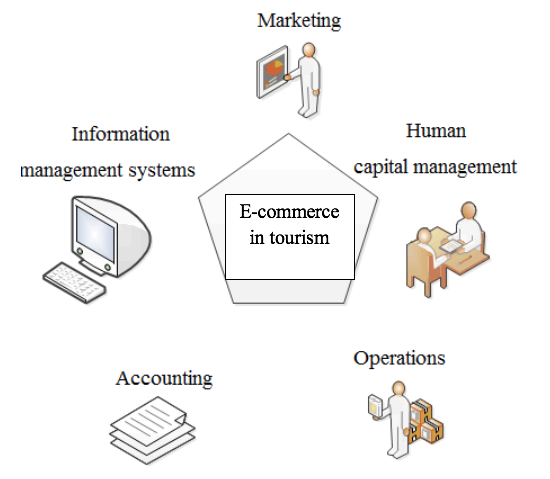
Table 1
Framework of service-oriented company
Sector |
Subjects |
accommodation sector |
hotels, motels, hostels and dormitories |
catering sector |
high-class catering businesses, middle class with a full range of services, theme café, fast food restaurants |
travel sector |
airlines, cruise ships, ground transportation, tourism business |
leisure and entertainment sector |
wellness centers, casinos, yacht clubs, theme parks, attractions, golf, tennis, exhibition halls, night clubs |
Meetings, incentives, conferencing, exhibitions sector (MICE) |
conference halls, banquet halls, concert halls |
All the listed companies can implement e-commerce systems and strategies at the B2C level. Some of them also include forms of interaction such as B2B, B2E, and even C2C. Most of the representatives of the accommodation sector in the B2C segment primarily focus on accommodation information for the potential customers.
The hospitality industry is always among the first to profit from the new technologies. The creation of e-commerce systems has changed the hospitality industry. Online sales became an important part of the business. Today almost all hotels have their websites, which can be easily accessed through the Internet. The websites are developed with the photo-graphics, so that visitors can view the hotel, rooms, adjacent territory and all the necessary amenities. Also, modern multimedia presentations are used in the competition for the consumer, they allow the user to take a virtual tour of the hotel and its surrounding areas, watch the weather live via webcams (in the resort city of Sochi, the hotels provide an opportunity to view the sea via cameras on their beaches). These websites allow potential customers to get acquainted with prices, special offers and booking conditions, as well as to make a payment and book a hotel room. Large network hotels supply their websites with an access to the online booking system, ensuring payment security. In the modern booking system, online booking companies are the intermediaries between accommodation facilities and consumers. They book rooms in various hotels, often at reduced prices and re-sale them to the tourists. Hotels use their services in order to increase occupancy in the non-holiday season.
The online booking system is designed to search for and book tours through the Internet, to quickly track the status and account of all the custom bookings. Due to the rapid development of technology, the old ways of obtaining and exchanging information are being replaced by newer and more sophisticated ones. In tourism, booking by telephone, fax or e-mail is a thing of the past (Molchanova, 2016; Molchanova, 2014; Molchanova et al., 2014).
The catering and travel sectors use similar e-commerce systems for B2C interactions. In case of restaurants, websites are created to attract potential customers through graphics and multimedia, encouraging them to book a table online or by phone. The MICE sector focuses on group orders. Companies in this sector are designing their websites for a convenient immediate booking for a group of individuals.
In 2016, Google carried out a survey, confirming the rapid increase of "online tourists" number. According to it, more than 90% of Russian tourists preferred the online search in choosing their leisure options in 2016. There was also a 60% increase in the number of requests from the mobile devices. Thus, mobile devices occupy increasingly stronger positions as the main search tools. In 2014-2015, the number of tourism-related searches from smartphones almost doubled, and this increase continued in the following year. The largest number of inquiries was the choice of accommodation options, the selection of transport and excursions, the definition of tourist destinations and search for attractions, as well as with package tours and plane tickets. Google concluded that the Internet today is primarily used to obtain the necessary information at the planning stage of travel. To find this information, most people use search engines and mobile devices. The study participants noted the lack of a mobile-friendly view on many websites, as well as mobile payment security problems as the main disadvantages of the "mobile" online searches (Google research: the number of requests).
Tourism industry companies have to follow the Internet trends and anticipate the possible customer wishes to remain competitive. According to the World Tourism Organization (WTO), the world tourist flow will have exceeded 1.5 billion people by 2020 (Official page of World Tourism Organization UNWTO). The e-distribution of various tourist services, including hotels, plane tickets and tours will increase due to a multitude of advantages for both consumers and suppliers. In recent decades, e-commerce systems were successfully used in all sectors of the tourism and travel industry, and the Internet became the main distribution channel for the hotel and travel services. E-commerce market evolved and moved from the stage of selling simple products (plane tickets, hotel rooms, car rental services) to more complex ones (tour packages and cruises). However, the lack of a user-friendly interface was mentioned many times during this development.
The relevance of e-commerce use in the hotel industry is determined by such factors as:
The popularity of various sources of tourist information as decision-making factors is presented in Figure 2.
Figure 2
Sources of tourist information, % (Tourism Economics…, 2013)
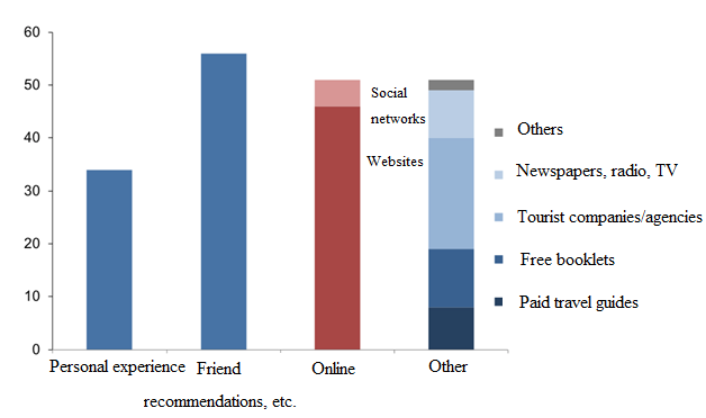
With the online booking system, one can quickly see the availability of hotels, as well as seats on the flight. It became much easier to choose a tour taking all the customer's wishes into account, to receive instant confirmation, and to remain competitive for the tour operators and travel agents (Booking of hotel on booking.com).
The processes of booking hotels, tours or tickets with the help of modern electronic commerce systems are carried out approximately in one scenario. The organization has several stages.
The approximate algorithm of online hotel booking is presented below.
1. The client enters the online booking website and gets acquainted with the rules;
2. The client selects a hotel and places the order in the system via email;
3. The system processes the order and sends a preliminary confirmation with the prepayment conditions;
4. After receiving appropriate guarantees from the client the agent gives the final confirmation of the reservation;
5. A copy of the final confirmation is sent to the hotel;
6. Booking information is stored in the load schedule with automatic change of the room fund status.
In case the hotel has its own webpage, the hotel reservation service responds to the incoming applications. The procedure for interaction is as follows.
1. The client enters the site of the online booking system and acquaints himself with the reservation rules;
2. Next, he finds a hotel to his liking and, making sure of availability of rooms and filling in the necessary information fields, sends the order directly to the hotel by e-mail;
3. The hotel's automated management system automatically processes the order (with the exception of non-standard cases) and sends a preliminary confirmation with the prepayment conditions, and the name of the potential client is entered in the waiting list;
4. After receiving the appropriate guarantees from the client (prepayment, letter of guarantee, etc.), the hotel gives the final booking confirmation;
5. Information about the reservation is entered in the loading schedule with the subsequent automatic change of the room fund status on the webpage (Sources and channels).
Millions of tourist arrivals are registered in the world every year. It is information technology in the tourist business that allows a common man to see the whole world by simplifying the tourist industry processes. The successful functioning of any company on the tourist industry is almost impossible without the use of modern information technology.
Currently, the introduction of e-reservation technologies completely “captured” travel agencies - the Internet has a serious impact on the development of tourism business all over the world. Internet systems and computer reservation systems became full participants of the tourist market. Figure 3 shows how the Internet simplifies the booking process, making it cheaper and faster than traditional travel agency services.
Figure 3
Different booking channels
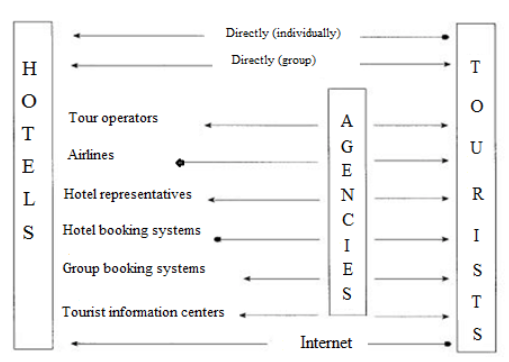
In addition to software, the Internet and computer network, the online reservation system also includes a network administrator, an official (representative of a particular hotel) and a consumer (Principles & Practices ...). Each performs its functions, which together form a booking process. (Table 2)
Table 2
Online hotel reservation system
Network administrator |
Hotel manager |
Customer |
Allows authorization in the system |
Is authorized in the system |
Registers in the system |
Registers participants |
Books rooms |
Enters the system |
Manages accounts |
Accepts payment (in cash) |
Checks the availability of rooms |
Manages reports and applications |
Monitors the room fund status and the number of clients |
Books a room |
Forms suggestions and related media |
Adds and updates customer information |
Makes payment |
Establishes rules and regulations |
Reviews customer requests |
Fills in a feedback form |
"Information on everything" is a feature of modern society. Tourists can get information about any hotel, any travel agency, and also leave feedback on the provided services. The introduction of electronic systems in the tourism services reduces the number of connections (intermediaries) and reduces the likelihood of errors (the human factor). In addition, communication technologies had a direct impact on the competitiveness of tourism companies. Modern technologies allow manufacturers not only to sell a unified tourist product, but to adapt it for a certain segment of the market. The advantages of online booking system compared to the traditional one are presented in Table 3.
Table 3
Advantages of the online hotel booking system
For the hotels |
For the tourists |
Immediate payment on the website
|
|
The hotel itself determines the quota for online booking, prices and additional services |
A guarantee of checking in at the prices of the hotel at the time of booking |
There is no need to contact the client as the booking is automatic without the participation of an administrator |
An opportunity to personally choose the period of stay, room category, a set of additional hotel services |
The system operates autonomously 24/7 |
|
The development of electronic airline booking has the same long history as the development of the e-commerce. E-commerce began with the introduction of the plane ticket reservation system in the 60s of the 20th century.
Currently, most airlines provide services for buying e-tickets for their flights, and there is a large number of online ticket agencies. The most popular "ticket offices" are: Onetwotrip.com, Trip.ru, Ozon.travel and others. It is easy to find all available offers of almost any airline on these websites. And since the websites of ticket agencies focus on sales, they are much more easy to use than the websites of many airlines (Purchase of air tickets online).
Figures 4 and 5 depict the search for a suitable flight on the Ozon.Travel website (russian version of website).
Figure 4
Online ticket search on the Ozon.Travel website (Booking of air tickets ...)
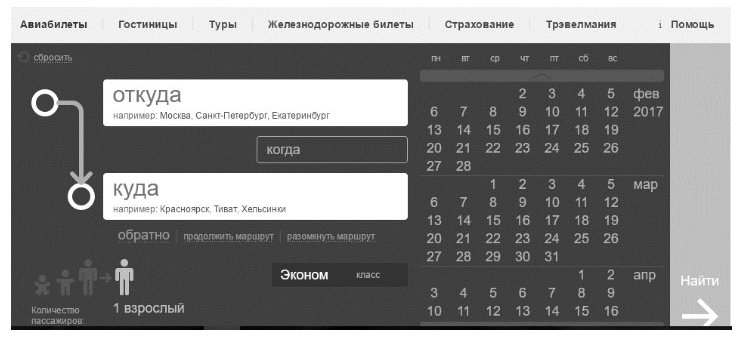
Notes:
Tickets Hotels Tours Railway Insurance Travelmania Help
Where from
When
Where to
Economy class
Number of passengers
According to the parameters of the ticket search for "Sochi-Moscow" direction on a specific date, the website issued 17 possible options with different price levels (from 1590 rubles to 6773 rubles).
Figure 5
Search result on the Ozon. Travel website
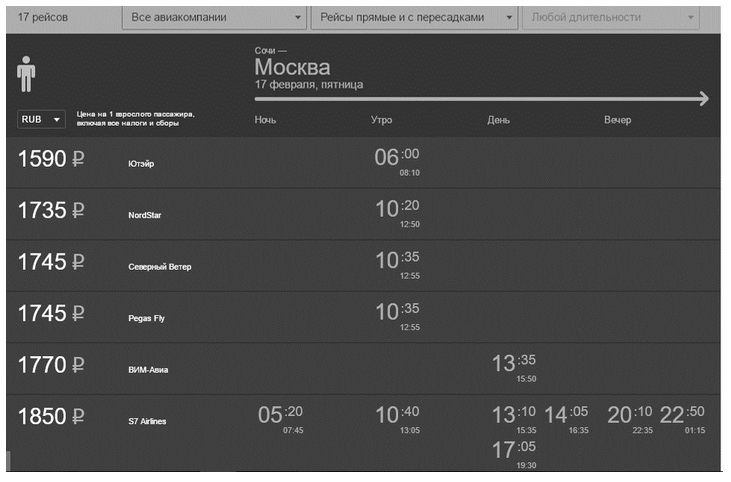
After choosing the most appropriate option, the buyer will enter personal information and pay the ticket. Information about all passengers is entered in the airline reservation system, and it is enough for the client to present a passport and a boarding pass at the check-in counter before the flight.
In addition to air and railway ticket and hotel booking system, there is a possibility of selecting an individual tour online. In recent years it became very popular among travel companies to offer themed exclusive tours. For example, a yoga tour, a family tour, "Following the Olympics" (Sochi) and many others. The tour is a hotel reservation and a full-fledged every day. The detailed information on each day cost of the tour and every additional excursion on the site makes the offer easy to access, and all the financial aspects are more “transparent” to the potential consumer. The selection and booking of the tour is carried out according to the same algorithm as booking of a hotel room.
Today, the Internet and other types of e-commerce are actively used in almost all business processes of tourist companies, from the moment of searching and attracting clients to the creation and sale of the final tourist product. Over the past decades, tourism e-commerce has been actively developing and contributing to the promotion of tourist destinations.
Thus, the use of e-commerce systems is a factor in increasing the efficiency and quality of tourism services and brings many benefits to the functioning of the tourism industry. Such advantages can be attributed to:
• Expansion of the channels for promotion of the tourist product;
• Reduction of costs;
• Ensuring the timelines and accuracy of information;
• Acceleration of operational processes, including payment;
• Improving the level and quality of customer service;
• Improving customer relations (feedback);
• The ability to adapt the offer to a potential demand;
• No temporary and spatial limitations in business.
Booking of air tickets for Ozon.Travel [Bronirovanie aviabiletov na Ozon.Travel] [Electronic resource] URL: http://www.ozon.travel/flight/search/ aermow/ d2017-02-17/ [in Russian].
Booking of hotel on booking.com [Bronirovanie otelya na booking.com.]. [Electronic resource]. URL: http://i-traveler.ru/booking.php [in Russian].
Ginanneschi M. (2014). The Impact of E-Commerce on Hotel Management: Evidences from a Sample of Tuscan Hotels. AlmaTourism, N. 10, pp. 88-108. [Electronic resource]. URL: almatourism.unibo.it/article/download/4775/4264
Google research: the number of requests for tourists from mobile phones grew by 60% (September 2016). [Issledovanie Google: kolichestvo zaprosov turistov s mobil'nikov vyroslo na 60% (sentyabr' 2016 g.)]. / Pro HOTEL [Electronic resource] URL: http://prohotel.ru/news-219733/0/
Grigoryan C.A., Ryabtsev A.A. (2010). International security experience in tourism // European researcher. № 1.
Gvarliani T.E., Borodin A.N. (2012). Problems and Prospects of Rural Tourism Development in Krasnodar Region // European Journal of Economic Studies, Vol.(1), № 1. pp. 18-30.
Huang Z., Benyoucef M. (2013). From e-commerce to social commerce: a close look at design features // Electronic Commerce Research and Applications, 12 (4) (2013), pp. 246-259. https://doi.org/10.1016/j.elerap.2012.12.003
Mamaghani, Farrokh (2009). Impact of E-Commerce on Travel and Tourism: An Historical Analysis. Mamaghani, Farrokh, International Journal of Management, December. [Electronic resource]. URL: https://www.questia.com/library/journal/1P3-1889954271/impact-of-e-commerce-on-travel-and-tourism-an-historical
Molchanova V.S. (2014). The Use of Online Service Booking in Tourist Activity // European Journal of Social and Human Science, 2014, Vol.(2), № 2. pp. 75-80.
Molchanova V.S. (2016). The Development of E-Commerce in Tourism Sphere. The Characteristics of the Main Internet Technologies Used in the Tourist Market // Tourism Education Studies and Practice, Vol.(7), Is. 1, pp. 16-28.
Molchanova V.S., Vidishcheva E.V., Potapova I.I. (2014). Retrospektiva razvitiya elektronnoi kommertsii na primere funktsionirovaniya mezhdunarodnogo internet-auktsiona Ebay [The Retrospective of E-Commerce Development: the Case Study of Ebay Functioning] // Actual problems of economics, V. 162. № 12, pp. 423-432.
Official page of World Tourism Organization UNWTO / Specialized agency of the United Nations [Electronic resource]. URL: www2.unwto.org
Omer Gibreel, Dhari A. AlOtaibi, Jörn Altmann (2018). Social commerce development in emerging markets // Electronic Commerce Research and Applications. Volume 27, January–February, pp. 152-162. https://doi.org/10.1016/j.elerap.2017.12.008
Principles & Practices of Software Production. Group Assignment / Asia Pacific Institute of Information Technology, 2013, 65 p. [Electronic resource] URL: https://www.slideshare.net/mobile/masterabhi/online-hotel-room-booking-33265026
Purchase of air tickets online [Pokupka aviabiletov onlain]. [Electronic resource]. URL: http://i-traveler.ru/pokupka_aviabiletov_online.php [in Russian].
Smirnov A. (2011). E-Commerce for the Hospitality Industry By Andrey // The Moscow Times Online Magazine [Electronic resource]. URL: https://themoscow times.com/articles/e-commerce-for-the-hospitality-industry-11256 [in Russian].
Sources and channels for obtaining hotel reservation requests [Istochniki i kanaly polucheniya gostinitsei zaprosov na bronirovanie nomerov]. [Electronic resource]. URL: http://www.mygel.ru/2010-08-26/zayavki_na_bronirovanie_ nomerov_v_gostinitse [in Russian].
Stolyarov D.Yu., Stolyarova I.Yu. (2016). The modern development trends in online sales of the tourist products // Sochi Journal of Economy. № 4 (42). pp. 266-274.
Tesone, Dana V. (2005). Hospitality Information Systems and E-Commerce. ISBN: 0-471-47849-0
Tourism Economics: The Impact of Online Content on European Tourism. An Oxford Economics Company, November 2013, 58 p. [Electronic resource]. URL: sete.gr/_fileuploads/entries/Online%20library/GR/131204_The%20Impact%20of%20Online%20Content%20on%20European%20Tourism.pdf
Vorobei E.K. (2012). Travel Small Businesses Tax Optimization in Modern Conditions // European Journal of Economic Studies, Vol.(1), № 1. Р. 71-80.
Zhuofan Yang, Yong Shi, Hong Yan (2016). Scale, congestion, efficiency and effectiveness in e-commerce firms // Electronic Commerce Research and Applications. Volume 20, November–December, pp. 171-182. https://doi.org/10.1016/j.elerap.2016.07.003
1. International Network Center for Fundamental and Applied Research, Russian Federation. Sochi State University, Russian Federation. E-mail: v.molchanova_1991@list.ru
2. Sochi State University, Russian Federation. E-mail: evgenia-vv@mail.ru
3. Astrakhan State University of Civil Engineering, Russian Federation. E-mail: ipotapowa@list.ru